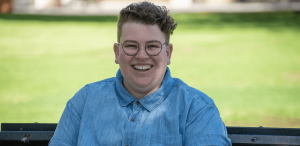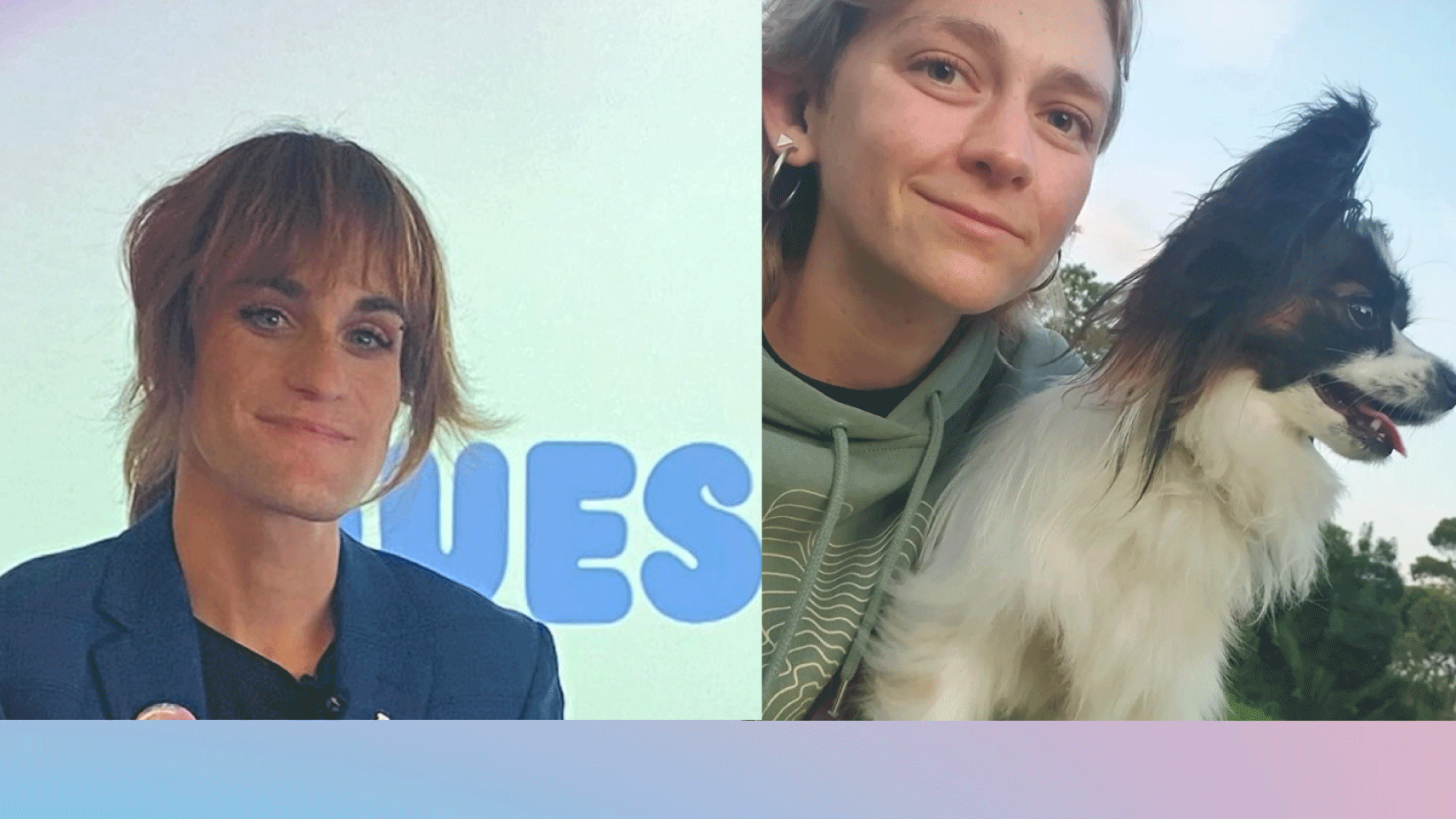Being non-binary and having an eating disorder: A trans person’s experience
In my early childhood, I felt indifferent about my body. It was the thing that allowed me to do the things I loved. It held the books I read, clung to the trees I climbed and ventured through the depths of the ditch at the end of my street to collect tadpoles. I was a child growing up in a country town in the 90s.
The Spice Girls were the band, cinema tickets cost six dollars, and the most exciting thing about turning a year older was choosing a cake from the Women’s Weekly Birthday book. I wore sneakers every day, paired with bright and floral homemade clothes and a lovely curly mullet. There was never a concern about how I looked to others because I was happy, and I simply didn’t care.
I was eight years old when I was first told I was overweight; and only then did I start to think that something was wrong with me.
Adding to this, was the impending realization that in a few years, puberty would be taking me in a direction I did not want it to go.
In my teen years, monthly bleeding brought with it a sense of grief, and oversized clothing, a sense of comfort.
I wanted to hide my body away from the world so I could avoid judgement and the eyes of critical onlookers.
At the time I told myself that I should feel comfort in knowing that my body was just doing what it was biologically meant to do.
In terms of my gender expression, I told myself I was just a tom boy. I was just sporty, loved the outdoors and wanted to stay active. Being sporty allowed me to don masculinity in a way that would have otherwise been deemed unacceptable – in many ways, the two were intrinsically linked.
I made sure I ate only “healthy food” in front of others. How could anyone possibly think I was consciously choosing to be “overweight” if all they could see was me being a “good” fat person? I wanted the approval of those around me and I wanted to feel normal.
And society was telling me that being slim, and cisgender was the normal way to exist, so I followed this narrative for so many years. This led to many years of disordered eating and a binge eating disorder, as well as experiences of gender dysphoria i.e. discomfort and distress that some trans people experience about their body, gender and/or how their gender is perceived. I still manage both of these things to this day, but in much healthier ways, and with a range of supports around me.
Most research on eating disorders and disordered eating focuses on and perpetuates the false idea that it is a heterosexual, affluent, cisgender, thin, white woman experience.
To date, the most comprehensive research on eating disorders for trans people found that trans college students reported experiencing disordered eating at approximately four times the rate of their cisgender classmates.
If we look at eating disorders as only belonging to a particular demographic, people who don’t fit into this mould i.e. same gender attracted, disabled, low income, fat, POC and /or gender diverse people, are not researched enough, will be diagnosed less and therefore receive a lower quality of treatment.
In a world where it is already difficult to get gender affirming care, this only adds to the burden that many trans, gender diverse and non-binary people experience when navigating health and medical systems. I think this is a huge disservice to our communities.
I can’t separate my body dissatisfaction with my experience of gender dysphoria, which is why I think there needs to be more focus on how eating disorders and disordered eating impacts trans, gender diverse and non-binary people.
When I started physically transitioning, there were changes that happened to my body that weren’t related to weight, but still made me more confident in myself, and therefore less self-conscious about how I was perceived by the world around me.
And while I spent the better part of my youth and early twenties trying to fit into women’s body standards, after starting testosterone and having top surgery, there are now different pressures from men’s and masculine body standards that I’m trying figure out how to navigate and break free from. This is an ongoing journey.
I used to want to be the product of society’s version of me, one that focused on the size and shape of my body and how it was perceived by others, attaching value and gender accordingly. I cannot lie and say I still don’t want this sometimes; I don’t think it’ll ever be possible to rid myself of these thoughts completely – society’s ideals around acceptable bodies are still strong and who are we all if not products of society itself.
But my end goal has changed. I now prioritise my health over my image – and it has taken a LONG time to get here. And rather than subscribing to body positivity, a concept that often perpetuates yet another binary system where our only option is to love (over hate) our body, I choose to focus on body liberation.
Instead of feeling like I’ve failed myself when I don’t feel that sense of unconditional love for my body, body liberation is able to free me from other people’s and society’s expectations all together.
It gives me room to love my body when possible, and appreciate the many journeys it continues to take me on, without placing my entire worth on it. I can love it for what it allows me to do, and still struggle with how it doesn’t align with society’s version of what is ‘acceptable’. Because at the end of the day, I know there is no such thing as a ‘good’ or ‘bad’ body.
There is no such thing as ‘good’ or ‘bad’ food. The Body Mass Index (BMI) is a flawed and outdated indicator of health, and I don’t have to accept people being “concerned” about my weight in order to justify fatphobia. Additionally, in time, I have come to realize that queer, trans and non-binary are terms that describe my experiences with sexuality and gender. All of this has had such a positive impact on my journey toward body liberation.
I feel a lot of empathy toward those around me who continue to enforce the gender binary and thinness as a constant end goal and measure of overall health. I know it comes from a place of wanting to fit in and wanting to be perceived as normal. I also know that the reason some people feel the need to enforce it, is because the only other option is to put aside a lifetime of hard work pursuing it themselves.
Everyone has their own journey and responsibility to educate themselves and challenge their misconceptions around what is ‘normal’ and ‘healthy’ and I acknowledge that everyone is at different stages, and this is okay.
These days, I sometimes I catch myself in the mirror and take a moment to take in my existence.
I look at the stretch marks that run across my stomach, a nod to the fact that it’s okay for bodies to change and grow. I also look at my chin and try to remember that not every photo needs to be taken from “a good angle” for me to feel worthy and good about myself.
My hands run down my chest, my index fingers following the scars under each of my nipples from the centre of my frame to below each of my armpits. I love my top surgery scars, and while I did use scar gel to minimize the scarring at first, my routine was never perfect. I think deep down I knew I didn’t want them to fade completely – they are a sign of where I’ve been and where I am going.
I know the typical trans narrative i.e. the one that cisgender people love to hear, is that trans people are “born in the wrong body.” While this is true for some trans people, it’s not the only narrative and it is not my narrative. I was born into exactly the body that I needed.
My body is mine and I don’t want to look or pass as cisgender. I am not cisgender and I am not trying to “perform” gender for other’s comfort. I am not thin, and for the first time in my life, I am not trying to be. I can acknowledge that I am curvy and fat, and this is a natural variation of bodily diversity.
I do what makes me feel comfortable and no one else. It doesn’t matter how many people don’t accept that, continue to assure me my size indicates my health, continue to call me she, used gendered terms for me and ignore that my queer identity is a central part of who I am.
My gender is mine, my body is mine. And for that, I am so proud.
 Stevie (they/them) is a writer, videographer and digital creator based in Boorloo (Perth, WA) on Whadjuk Noongar Boodja. They have 10 years experience advocating for the rights of LGBTIQA+ people and other marginalised groups throughout Australia. They love to use their lived experience as a queer, trans and non-binary person to connect with others, educate and create change. For more information about the work they do, you can visit their website at stevielane.com.au or go directly to their instagram page @TheQueerAdvocate where they create a range of resources and share their personal experiences of queerness and transition.
Stevie (they/them) is a writer, videographer and digital creator based in Boorloo (Perth, WA) on Whadjuk Noongar Boodja. They have 10 years experience advocating for the rights of LGBTIQA+ people and other marginalised groups throughout Australia. They love to use their lived experience as a queer, trans and non-binary person to connect with others, educate and create change. For more information about the work they do, you can visit their website at stevielane.com.au or go directly to their instagram page @TheQueerAdvocate where they create a range of resources and share their personal experiences of queerness and transition.






















